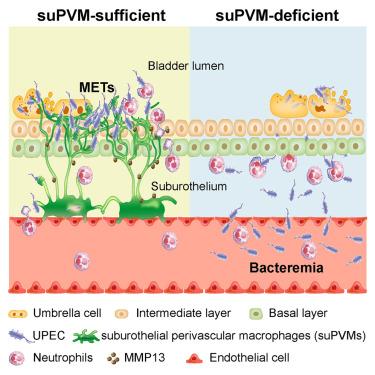由上皮下血管周围巨噬细胞构成的膀胱-血液免疫屏障抑制尿路病原体的传播
IF 25.5
1区 医学
Q1 IMMUNOLOGY
引用次数: 0
摘要
尿路感染(uti)主要发生在膀胱,如果尿路病原体不受限制地扩散到血液中,可能会发展成危及生命的败血症。在这里,我们确定了膀胱中上皮下血管周围巨噬细胞(supvm)的一个亚群,它们在急性膀胱炎期间发挥关键的屏障功能,以防止全身细菌传播。在尿路致病性大肠杆菌(UPEC)感染的初始阶段,supvm积极捕获入侵层固有的UPEC,并维持炎症血管的完整性。随后,他们进行了METosis,将巨噬细胞细胞外DNA陷阱(METs)排出尿路上皮,将细菌隔离在这个无血管室中。基质金属肽酶-13与METs一起释放,促进中性粒细胞经上皮上迁移。来自先前感染的单核细胞的补充supvm在功能上有能力赋予对复发性尿路感染的保护。因此,我们的研究揭示了膀胱-血液免疫屏障在抑制尿路病原体传播方面的作用,这可能对尿路败血症的预防和治疗具有重要意义。本文章由计算机程序翻译,如有差异,请以英文原文为准。

A bladder-blood immune barrier constituted by suburothelial perivascular macrophages restrains uropathogen dissemination
Urinary tract infections (UTIs) predominantly occur in the bladder and can potentially progress into life-threatening sepsis if uropathogens spread unconstrainedly into the bloodstream. Here, we identified a subset of suburothelial perivascular macrophages (suPVMs) in the bladder that exerted a pivotal barrier function to prevent systemic bacterial dissemination during acute cystitis. During the initial phase of uropathogenic Escherichia coli (UPEC) infection, suPVMs actively captured UPEC invading the laminal propria and maintained the integrity of inflamed vessels. They subsequently underwent METosis to expel macrophage extracellular DNA traps (METs) into the urothelium to sequester bacteria within this avascular compartment. Matrix metallopeptidase-13 was released along with METs to promote neutrophil transuroepithelial migration. Replenished suPVMs from monocytes following a prior infection were functionally competent to confer protection against recurrent UTIs. Our study thus uncovers a bladder-blood immune barrier in restraining uropathogen dissemination, which could have implications for the prevention and treatment of urosepsis.
求助全文
通过发布文献求助,成功后即可免费获取论文全文。
去求助
来源期刊

Immunity
医学-免疫学
CiteScore
49.40
自引率
2.20%
发文量
205
审稿时长
6 months
期刊介绍:
Immunity is a publication that focuses on publishing significant advancements in research related to immunology. We encourage the submission of studies that offer groundbreaking immunological discoveries, whether at the molecular, cellular, or whole organism level. Topics of interest encompass a wide range, such as cancer, infectious diseases, neuroimmunology, autoimmune diseases, allergies, mucosal immunity, metabolic diseases, and homeostasis.
 求助内容:
求助内容: 应助结果提醒方式:
应助结果提醒方式:


